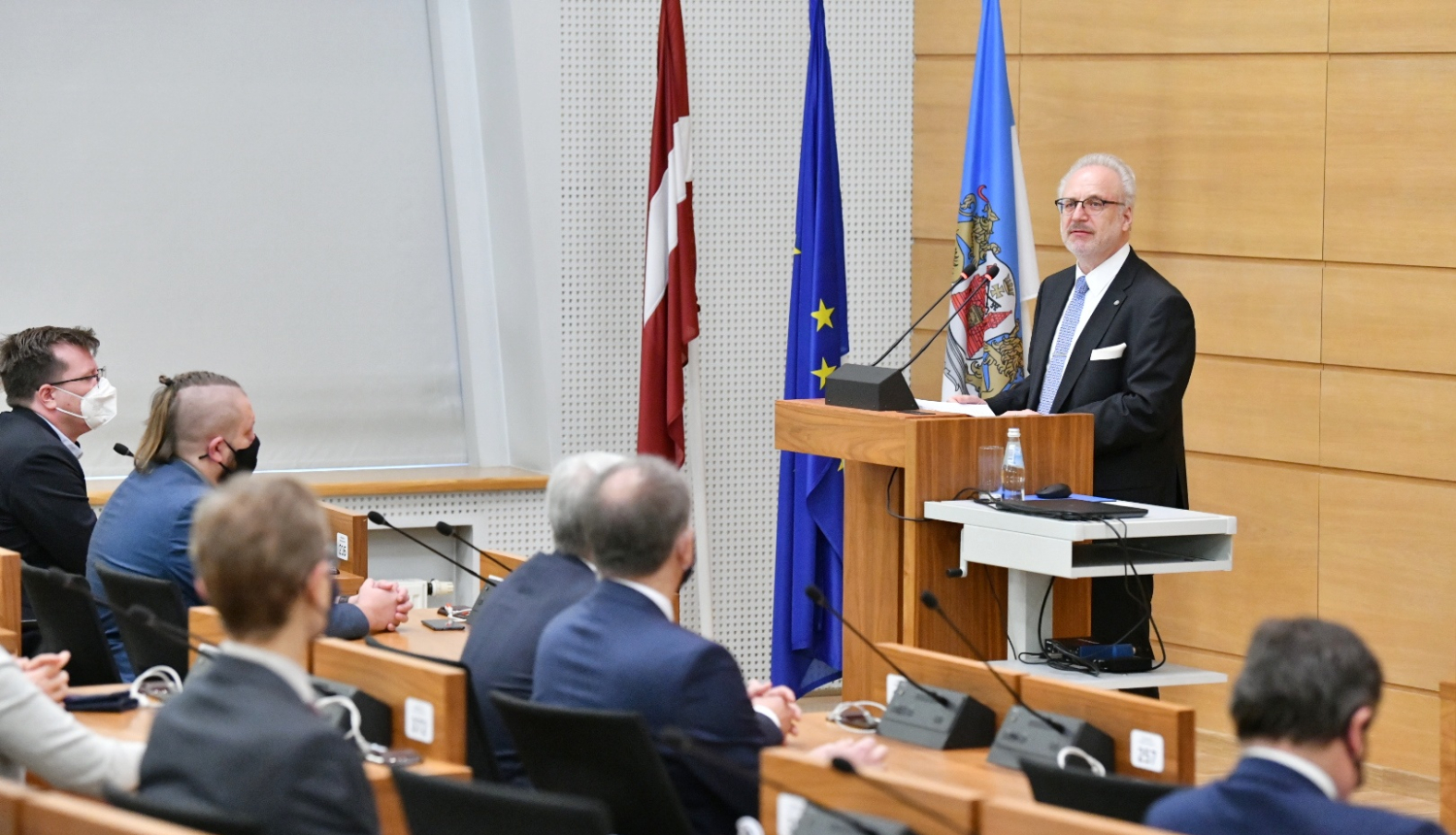President of Latvia Egils Levits raised key strategic questions about Riga’s development, its role and mission as the capital of Latvia, and the need to boost the quality of life in Riga, during meeting with members of the capital’s political leadership on 7 October.
President of Latvia confirmed his support for the idea to give Riga as the capital a special status by changing the Law on Local Governments, recognising the significance of such initiative: ‘By giving special status to Riga as the capital, we acknowledge its economic, educational, scientific and cultural value. Special legal status also entails responsibility towards Latvia. Strategic development of Riga is closely intertwined and integrated with the national path of development.’
Egils Levits offered his comments about 2021-2027 Riga Development Programme, which is in the public consultation stage, emphasising the vision of Riga as the metropolis of the North, a regional leader who offers higher quality of life to its inhabitants, striking a balance between development needs in different sectors. President praised Riga’s leadership for building a working relationship with neighbourhood associations, commending them for supporting direct democracy by involving neighbourhoods in shaping city’s future.
He stressed that the new leadership of Riga City has vowed to be open and transparent, and ‘that is the kind of governance model everyone has been waiting for.’
He also praised Riga’s focus on sustainability. ‘Riga is key for Latvia’s greening ambitions, it needs to significantly cut down the emissions it generates,’ Egils Levits stated.
President of Latvia also urged Riga to not lose sight on specific goals and ambitions that would allow Riga to catch up with Tallinn and Vilnius, which are booming currently and have surpassed Riga lately, although generally Latvia’s capital is going in the right direction.
As regards to Riga’s development plans, President of Latvia referred to economic activity rate as the key element of the potential of greater area of Riga: ‘If we want a developed state, we need to support the growth of Riga and its agglomeration. It is and will remain the engine of the overall growth of our country.’
He also reminded members of the Riga City Council that its historical centre is part of the UNESCO World Heritage List and urged to avoid spoiling it with “poorly designed buildings that would destroy to homogeneity of the urban environment”, while adopting a “more flexible approach” to use of buildings in the city centre and “allowing, for example, to keep the historical façade and change the room layout to create a more convenient living space and diversify the use of the building”.
Egils Levits urged city leadership to consider financial incentives for young families looking to buy their first home. Their financial opportunities may be limited, and this would be a great way to support the city and its demographics.
President of Latvia mentioned the regional role of Riga and its participation in international infrastructure projects, including Rail Baltica and the Three Seas Initiative.
President stressed that considering the role of Riga as the national hub for science, education, culture and innovations, closer synergies between these areas should be sought to create the so-called clusters of excellence, such as the New Teika, a “two square kilometre stretch housing 42% of Latvia’s ICT sector turnover”, or material science clusters like the one operated by the University of Latvia Institute of Solid State Physics.
Egils Levits urged Riga City Council to support the development of the so-called ‘knowledge mile’ on the left bank of the Daugava River. ‘Riga would benefit from such knowledge mile also from a branding perspective. This stretch has several universities and institutes that make Riga what it is and attract people. We should capitalise on that more. Let us, for example, take Grenoble or Gottingen. The first thing that pops into your mind is science and universities, education and culture. I believe Riga must strive for similar image,’ President of Latvia underlined.
Riga, like Latvia, needs its own higher education strategy, which is centred around raising investments, President also noted. ‘Scientific, educational and cultural prowess is the future of Latvia and also Riga. Economic benefits will follow,’ Egils Levits added.
He reminded councilmen and women that they have pledged to resolve the preschool education issues when they gave their oath.
Egils Levits also touched upon Riga’s cultural significance: ‘Latvia offers very interesting cultural agenda, but most of professional cultural institutions in Riga are funded from the national budget. I urge the administration of Riga to pay greater attention to creating its own cultural institutions that would make the cultural life richer. For example, there is still no concert arena and contemporary art museum that inhabitants of Riga could enjoy. Riga should not shy away from its responsibility for preserving our cultural heritage, more effort should go into supporting non-tangible culture.’
In conclusion, President of Latvia Egils Levits reiterated the enormous future role of Riga: ‘Riga needs to nurture excellence to become a true metropolis of the North. That is what inhabitants of Riga and residents of Latvia expect from the Riga City Council.’




